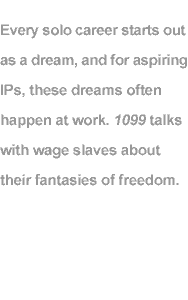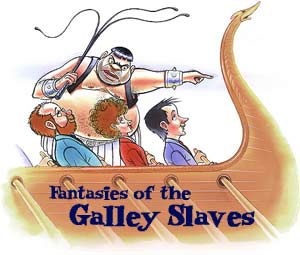 |
|
||||||||||||
 |
|
||||||||||||

|

|
|
By Beth Pinsker
|
At Jackie Ohringer's country inn, her boyfriend Josh Pappas is the celebrated chef. Her friend Stacie, a research librarian by day, is the respected sommelier on the dinner shift. Mike, an independent publicist, writes the copy for the brochures, and Steve, a professional photographer, takes happy snapshots of the spacious estate. Ohringer, the business manager, makes sure they have all have projects to look forward to, and bakes the muffins for breakfast, too. Sounds lovely, doesn't it? Friends helping friends to do what they love? Unfortunately, it's only a fantasy -- so far. While Ohringer sits at her desk in midtown Manhattan's Rockefeller Center, running the numbers on paper costs around the globe and checking up on press maintenance as a finance manager at Time-Warner, she can only dream. She has been sitting there since college, though crunching numbers has never been a true love... But how can she move from being an accountant to running a country inn? Along with Pappas, a 27-year-old formally trained chef, Ohringer takes weekend seminars on starting food businesses and travels to inns whenever she can. She asks a lot of questions and looks at a lot of real estate. Ohringer studies business plans and learns everything she can about business from within Time-Warner; Pappas works for others as a chef and restaurant consultant. One day the dream will come true. In the meantime, there's a lot of uncertainty. "How do you convince yourself that you actually have an idea that's not totally out there?" wonders Ohringer, who just turned 30. "How do you convince yourself that it's not a bad thing? Some of the most successful people on earth have the most hair-brained ideas." But starting a country inn isn't exactly skydiving sans parachute off a financial ledge. It's as sound a business, certainly, as an Internet start-up. It only seems harebrained because it's riskier than a full-time job with benefits and a healthy 401(k). A Home of His Own "America is based on entrepreneurship" says Jason Spages, a 30-year-old wine merchant who, for now, works for a small importer in New Jersey but dreams of opening his own shop. He wants to settle into a comfortable community in one of those towns (either in northwest New Jersey or a place on the Eastern Shore like Red Bank) that increasingly attract urban professionals with a fondness for good wine. After years of traveling and soliciting orders for others, he wants a home. "In order to make it, it's not necessarily about money. You have to be happy with your job," he says. "You have to be able to enjoy life. Working for yourself means a lot of headaches, but there are also a lot more rewards." And what exactly do they say, these fantasy people who are supposed
to be creating the new economy, who have actually gone out on their
own and like it better? |
||||
| |||||
|
February 21, 2000 Primary Editor: Eric Gershon Illustrator: Steve Smallwood Production: Fletcher Moore |
We'd love to hear your comments about this article! Beth Pinsker is a freelance writer based in New York. For three years she was the staff theater critic at The Dallas Morning News. | ||||
| |||||